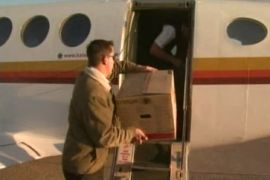Botswana’s flying doctors
Airborne medics deliver drugs and care to people with Aids.

 |
Suffering from the second highest rate of HIV/Aids infection in the world, Botswana is attempting to tackle the deadly epidemic.
The African nation – which has already won praise for its progressive Aids policies, including the free provision of anti-retroviral drugs – is now operating a medical air service to take medicine and specialist health care to remote areas.
Keep reading
list of 4 itemsDeadly Sahel heatwave caused by ‘human-induced’ climate change: Study
Woman, seeking loan, wheels corpse into Brazilian bank
UK set to ban tobacco sales for a ‘smoke-free’ generation. Will it work?
Al Jazeera’s Kalay Maistry was given exclusive access to this fledgling project which serves five locations, including a small village on the outskirts of the Okavango Delta.
Cargo is being loaded and secured on the aeroplane as it prepares for takeoff, but this is no ordinary flight.
The people onboard are specialist health workers equipped with medicines, and they hope to bring life to Botswana‘s rural poor – especially those living with HIV/Aids.
The flights, operated by the Airborne Lifeline Foundation, run twice a week to five rural villages.
To reach a place like Gumare, a small village on the outskirts of the Okavango Delta, it usually takes a day’s driving – but by plane it takes less than two hours.
‘Scarce resources’
“When we realised the distances that were involved and the scarce medical resources that were involved, we thought we’d try this out as an experiment,” Johnathan Miller, of the Airborne Lifeline Foundation, told Al Jazeera.
“Scarce resources can be used more efficiently by using aircraft rather than land transport.”
| HIV in Botswana |
|
Botswana has the second highest HIV rate in the world after Swaziland. In a country of 1.7 million people that is almost a quarter of the adult population. $165m was spent on on Aids treatment in 2005. |
The service has been running for about two months and is already making a difference.
One HIV-positive patient, a 55-year-old man, who began taking anti-retroviral drugs after the flights began, said his immune system had already improved.
Blood is taken from patients in hospitals, and because of the medical flights, it can now be packaged and speedily sent off for analysis.
The medical air service also transports the simple things that help keep hospitals runnning smoothly, things like light bulbs.
Botswana‘s drive to fight the disease, like in other African countries, is hampered by the migration of skilled medics to the developed world.
The government, however, says that the medical flights will help improve rural health care.
“What it is going to achieve is making the patients of this country no matter where they are access health care especially when it comes to the HIV/Aids conditions. They will all access equal health care,” Mompati Mmalane, director of clinical services, said.
If this project takes off here there are plans to provide the medical air service to other HIV-stricken African countries.